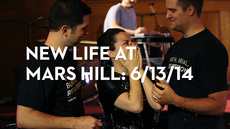Now an angel of the Lord said to Philip, “Rise and go toward the south to the road that goes down from Jerusalem to Gaza.” This is a desert place. 27 And he rose and went. And there was an Ethiopian, a eunuch, a court official of Candace, queen of the Ethiopians, who was in charge of all her treasure. He had come to Jerusalem to worship 28 and was returning, seated in his chariot, and he was reading the prophet Isaiah. 29 And the Spirit said to Philip, “Go over and join this chariot.” 30 So Philip ran to him and heard him reading Isaiah the prophet and asked, “Do you understand what you are reading?” 31 And he said, “How can I, unless someone guides me?” And he invited Philip to come up and sit with him. 32 Now the passage of the Scripture that he was reading was this:
“Like a sheep he was led to the slaughter
and like a lamb before its shearer is silent,
so he opens not his mouth.
33 In his humiliation justice was denied him.
Who can describe his generation?
For his life is taken away from the earth.”
34 And the eunuch said to Philip, “About whom, I ask you, does the prophet say this, about himself or about someone else?” 35 Then Philip opened his mouth, and beginning with this Scripture he told him the good news about Jesus. 36 And as they were going along the road they came to some water, and the eunuch said, “See, here is water! What prevents me from being baptized?” 38 And he commanded the chariot to stop, and they both went down into the water, Philip and the eunuch, and he baptized him. 39 And when they came up out of the water, the Spirit of the Lord carried Philip away, and the eunuch saw him no more, and went on his way rejoicing. 40 But Philip found himself at Azotus, and as he passed through he preached the gospel to all the towns until he came to Caesarea.
Introduction
Imagine during a Sunday worship service, a crazy thought enters your mind. You can’t shake it. You need to leave church and walk to a nearby coffee shop. It’s not that you lack focus on the sermon or you suddenly crave a chai latte; this is a direction not from your own imagination but from the Holy Spirit. As you enter the coffee shop, you notice an open seat next to an unusual-looking fellow. He’s not dressed like most folks in this part of town. He’s obviously not from around here. Perhaps even a foreigner. His head is buried deep in a book, and as he looks up with puzzlement on his face, he turns to you and asks, “I don’t get this. What does John 3:16 mean anyway?”
The Holy Spirit has set up the perfect opportunity for you to share the good news of Jesus Christ with a stranger.
In this section of Acts, we see the Holy Spirit call Philip from success in Samaria, where many convert, to a lonely desert road between Jerusalem and Gaza. Here, the story of the early church and the unfolding of God’s salvation plan begin a new path. To this point, the good news of Jesus has been preached to crowds, and conversion has happened en mass. Now, we see how God uses Philip the Evangelist to save one man—and not any man but an Ethiopian eunuch, with dark skin, from a land far away, and physically maimed in such a way that even though he fears the Lord, he can never enter the temple courts to worship in his presence.
Luke’s account demonstrates that God will position each of us to reveal his glory. The Ethiopian eunuch shows us that no matter our background, God will answer the questions of those who ask with a humble and sincere heart. And most importantly, through the power of the Holy Spirit with the good news of Jesus Christ, God will radically save the unlikely.
Observation
- Who are the main characters in this passage, both physical and spiritual?
- Where was Philip previously (Acts 8:4–25), and what had he been doing? Why does he now change his location?
- Where was the Ethiopian returning from? What is a eunuch? What do we know about his social status in Ethiopia?
- What was the eunuch doing as Philip approached his chariot? Why is this important?
- How does Philip guide the eunuch? How does the eunuch respond? What action is taken to memorialize their encounter?
- Where do Philip and the eunuch go next (implied)?
Interpretation
- Read Jonah 1:1–3. How was Jonah called to Nineveh, and how did he respond? How was Philip called to the eunuch, and how did he respond? Who initiates salvation both in these accounts and in all situations? Using Jonah and Philip as examples, what part do we play in the story of salvation?
- Some scholars differ on whether the Ethiopian was a physical eunuch. If he had been one, how would Deuteronomy 23:1 have impacted his recent visit to Jerusalem? How did Philip’s encounter with the eunuch fulfill Acts 1:8?
- The eunuch is reading from Isaiah 53:7–8, an Old Testament book that prophesies of the coming Messiah. The specific section foretells a Suffering Servant. Philip began with this Scripture (Acts 8:35) and told the good news of Jesus, although his actual words are not recorded. Using Acts 8:32–33, how do you think Philip specifically revealed Christ to the eunuch?
- What three questions does the eunuch ask Philip (vv. 31, 34, and 36)? What do these questions suggest about his character?
- Read Isaiah 56:3–8. Two barriers prevent the eunuch from being considered a “full Jew”: his ethnicity and his physical mutilation. What is the answer to the eunuch’s question in Acts 8:36?
- Philip has just previously proclaimed Christ in Samaria (8:4–8). Why was Simon the Magician not accepted by church leadership (vv. 20–24)? What do the baptism of the eunuch and the challenge to Simon reveal about what God values (v. 21)?
Application
- The Holy Spirit commands Philip to leave Samaria, a region where crowds come to Christ, and witness to one unlikely Ethiopian. God values one soul as much as a crowd, and often calls us to what the world deems foolish or unfruitful. How is the Holy Spirit calling you to an unlikely, seemingly unfruitful place?
- The Ethiopian eunuch is returning from Jerusalem, the city of Jesus’ death and resurrection, now filled with several thousand Christian believers. Either he was oblivious that the Messiah had come or had rejected it, yet the Holy Spirit chases him down literally through the feet of Philip. How has God pursued you or is currently pursuing you in order to save you?
- What are some common barriers you construct that you mistakenly believe keep you from Christ? What promises from Scripture demolish those barriers? Make a list with your group members of the many barriers and promises that refute them to keep for future moments when the Holy Spirit directs you to share the good news of Jesus.
For further study
You may notice that the ESV omits Acts 8:37 as do most common translations. You can find Acts 8:37 in the KJV, NKJV, and NASB. Acts 8:37 (NKJV) reads as follows: “Then Philip said, ‘If you believe with all your heart, you may.’ And he answered and said, ‘I believe that Jesus Christ is the Son of God.’”
Scholars believe that verse 37 was not original to Luke’s account, as it does not occur in some of the earliest and most highly regarded versions of Acts. A copyist is believed to have added it at some point. John Polhill states:
The added verse, however, has considerable value. It seems to embody a very early Christian baptismal confession where the one baptizing asked the candidate if he believed in Christ with all his heart, to which the candidate would respond by confessing Jesus Christ as the Son of God. This old confession is of real significance to the history of early Christian confessions and would be appropriate to the baptismal ceremony today.
This devotion is adapted from the Acts Study Guide: Chapter 6–11. Pick up a copy today for only $9.99. The Study Guide includes an 11-week curriculum with small group studies, group inductive studies, as well as 55 daily devotions for your personal or family worship.















